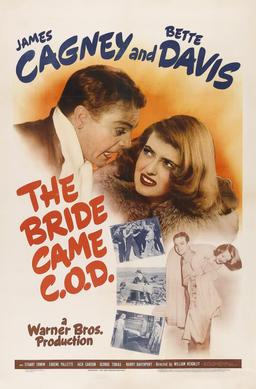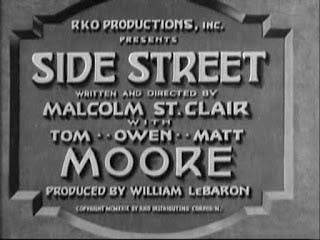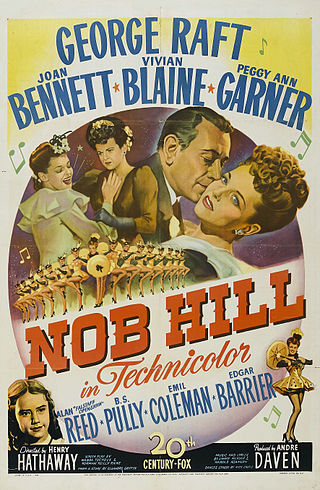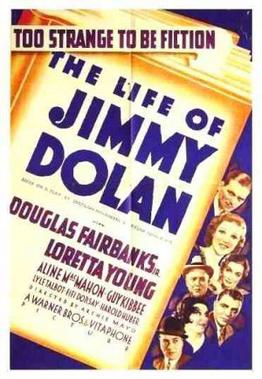
James Francis Cagney Jr. was an American actor and dancer. On stage and in film, he was known for his consistently energetic performances, distinctive vocal style, and deadpan comic timing. He won acclaim and major awards for a wide variety of performances.

Rose Joan Blondell was an American actress who performed in film and television for 50 years.

George Raft was an American film actor and dancer identified with portrayals of gangsters in crime melodramas of the 1930s and 1940s. A stylish leading man in dozens of movies, Raft is remembered for his gangster roles in Quick Millions (1931) with Spencer Tracy, Scarface (1932) with Paul Muni, Each Dawn I Die (1939) with James Cagney, Invisible Stripes (1939) with Humphrey Bogart, and Billy Wilder's comedy Some Like It Hot (1959) with Marilyn Monroe and Jack Lemmon; and as a dancer in Bolero (1934) with Carole Lombard and a truck driver in They Drive by Night (1940) with Ann Sheridan, Ida Lupino and Bogart.

Each Dawn I Die is a 1939 gangster film directed by William Keighley and starring James Cagney and George Raft. The plot involves an investigative reporter who is unjustly thrown in jail and befriends a famous gangster. The film was based on the novel of the same name by Jerome Odlum and the supporting cast features Jane Bryan, George Bancroft, Slapsie Maxie Rosenbloom, and Victor Jory.

Archibald L. Mayo was a film director, screenwriter and actor.

The Bride Came C.O.D. is a 1941 American screwball romantic comedy starring James Cagney as an airplane pilot and Bette Davis as a runaway heiress, and directed by William Keighley. Although the film was publicized as the first screen pairing of Warner Bros.' two biggest stars, they had actually made Jimmy the Gent together in 1934, and had wanted to find another opportunity to work together.

Invisible Stripes is a 1939 Warner Bros. crime film starring George Raft as a gangster unable to go straight after returning home from prison. The movie was directed by Lloyd Bacon and also features William Holden, Jane Bryan and Humphrey Bogart. The screenplay by Warren Duff was based on the novel of the same title by Warden Lewis E. Lawes, a fervent crusader for prison reform, as adapted by Jonathan Finn.

The House Across the Bay is a 1940 film directed by Archie Mayo, starring George Raft and Joan Bennett, produced by Walter Wanger, written by Myles Connolly and Kathryn Scola, and released by United Artists. The supporting cast features Lloyd Nolan, Walter Pidgeon and Gladys George.

Taxi! is a 1932 American pre-Code film directed by Roy Del Ruth and starring James Cagney and Loretta Young.

Side Street is a 1929 American Pre-Code film featuring the only screen teaming of all three Moore Brothers, each of them major silent film stars. George Raft also makes an uncredited appearance as a professional dancer — which Raft was at the time — dancing to the song "Take a Look at Her Now", sung by June Clyde. Side Street was directed by Malcolm St. Clair with a screenplay by George O'Hara and Jane Murfin, based on a story by St. Clair, which was adapted by John Russell.

Queen of the Night Clubs is a 1929 American Pre-Code musical drama film produced and directed by Bryan Foy, distributed by Warner Bros., and starred legendary nightclub hostess Texas Guinan. The picture, which featured appearances by Eddie Foy Jr., Lila Lee, and George Raft, is now considered a lost film. A still existing vintage movie trailer of this film displays no clip of the feature.

Nob Hill is a 1945 Technicolor film about a Barbary Coast, San Francisco, United States saloon keeper, starring George Raft and Joan Bennett. Part musical and part drama, the movie was directed by Henry Hathaway. It remains one of Raft's lesser known movies even though it was a big success, in part because it was a musical.

The Life of Jimmy Dolan, released in the UK as The Kid's Last Fight, is a 1933 American pre-Code film starring Douglas Fairbanks Jr. and Loretta Young. John Wayne has a small supporting role as a frightened boxer. The story was based on a 1933 play called "Sucker" by Bertram Millhauser. The film was remade in 1939 as They Made Me a Criminal.

City for Conquest is a 1940 American epic drama film directed by Anatole Litvak and starring James Cagney, Ann Sheridan and Arthur Kennedy. The picture is based on the 1936 novel of the same name by Aben Kandel. The supporting cast features Elia Kazan, Anthony Quinn, Donald Crisp, Frank McHugh, Frank Craven and Lee Patrick.

Joan P. Holloway Harris is a fictional character on the AMC television series Mad Men (2007–15). She is portrayed by Christina Hendricks.

Margaret "Peggy" Olson is a fictional character on the AMC television series Mad Men. She was portrayed by Elisabeth Moss and served as the show's female lead. Initially, Peggy is secretary to Don Draper, creative director of the advertising agency Sterling Cooper. She soon discovers her passion for copywriting and due to her talent, Draper takes her on as his protégé. Her rise is an integral part of the series and plays a key role in every season of Mad Men. After Don, she has the highest number of episode appearances, appearing in 88 out of the 92 episodes.
"The Other Woman" is the eleventh episode of the fifth season of the American television drama series Mad Men and the 63rd episode of the series overall. It is co-written by Semi Chellas and Matthew Weiner, and directed by Phil Abraham. It aired on AMC in the United States on May 27, 2012.
Waterfront is a 1939 Warner Bros. crime-drama film directed by Terry O. Morse and starring Gloria Dickson, Dennis Morgan and Marie Wilson. It was adapted from the play Blind Spot by Kenyon Nicholson. It is preserved at the Library of Congress.
"A Night to Remember" is the eighth episode of the second season of the American television drama series Mad Men. It was written by Matthew Weiner and Robin Vieth; and was directed by Lesli Linka Glatter. The episode originally aired on September 14, 2008.















